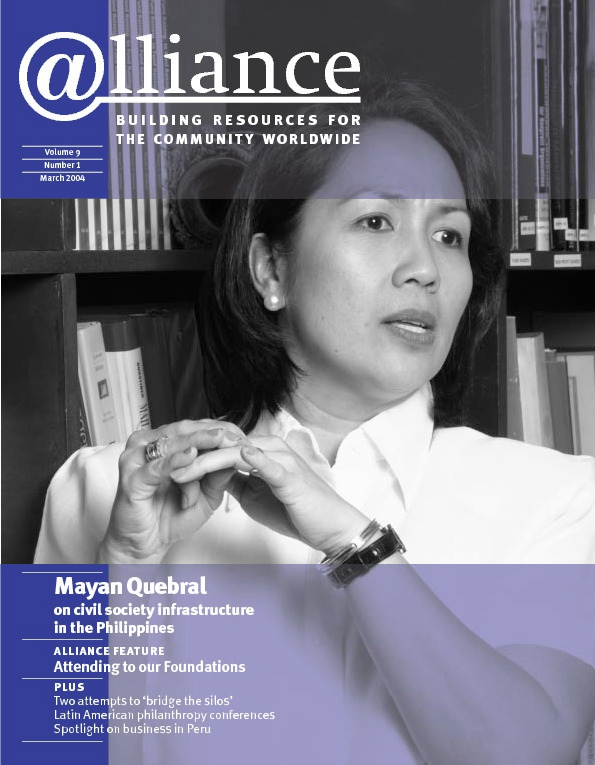Following a decade of successful operations in the US, interest in the GuideStar model in other countries has started to grow. Civil Society Systems (CSS), a non-profit organization registered in the UK and the US, was founded in September 2004 to support the development of GuideStar-modelled systems in countries worldwide. With GuideStar UK set to launch in November 2005, work is under way in South Africa, Germany, India and Hungary. The Caribbean region and Israel are next on the list.
The GuideStar model captures extensive information about the work of a country’s civil society organizations (CSOs). It presents this information in a highly searchable form online at a free website. The aim of making information available and establishing greater transparency is to encourage more philanthropy, more effective CSO operations and a better allocation of society’s resources.
GuideStar UK and beyond
The UK is the first country to implement its own GuideStar-modelled system. The official launch in November is the culmination of a process that started in May 2002.[1]
http://www.guidestar.org.uk brings together existing public information on 167,000 registered charities in England and Wales in one place for the first time. It gathers information from the documents charities file with the Charity Commission for England and Wales and from charities directly. Thousands of charities of all sizes have already responded to the opportunity to add up-to-date information and documents to their entry. The free website is thus set to become the first place anyone wanting information on a charity will look.
CSS is currently supporting new programmes in South Africa, Germany, India and Hungary. In early 2006 we will be embarking upon development projects in the Caribbean region and Israel and continuing dialogues with a number of other countries.
The GuideStar model
Each country project follows a similar pattern. During the ‘Development Phase’ of six to nine months, CSS establishes strategic relationships with key stakeholders including CSOs, funders, the media and relevant government agencies. A business plan is then produced outlining strategies for data acquisition, funding and revenue generation over the medium to long term, and strategies for enabling wide participation by CSOs.
At this early stage it is crucial that the initiative is supported by well-regarded individuals and institutions in each country. First, each project is linked closely to one or two well-regarded partner institutions. In South Africa, the project is hosted by the Nelson Mandela Foundation, in India by the Credibility Alliance and GIVE Foundation, in Hungary by the Nonprofit Research Group and in Germany by the Maecenata Institute. In Trinidad and Tobago CSS will be working in partnership with UNDP and in Israel with Yad Hanadiv Foundation.
Another key element of each project is the Steering Committee, made up of a country’s civil society leaders, whose role is to advise the project manager and to make relevant introductions to their own contacts and networks.
This model has led to a variety of interesting relationships. In South Africa, a partnership between the Nelson Mandela Foundation, the Department for Social Development and the National Development Agency should guarantee the flow of government-held data to the system while ensuring that South African civil society has a real sense of ownership of the initiative and all types of CSO can participate. In Germany a different model will likely emerge involving joint ownership of the ongoing entity by the country’s key non-profit umbrella organizations. It is still too early to predict the model that India and Hungary will pursue.
What we have learned over the last year is that while in many ways the economic, political and cultural contexts in which civil societies develop and operate vary widely from country to country, there are also striking similarities in terms of the challenges faced by CSOs everywhere. A key barrier to the successful achievement of their goals is the paucity of good information on CSOs and on the sector as a whole.
This ‘information vacuum’ means that decision makers – be they donors, government regulators and policy makers or the CSOs themselves – have to make decisions regarding the disbursement of resources without reliable information about the direction, resources and past performance of CSOs. As a result resources may be ineffectively allocated and trust in the sector compromised. GuideStar aims to enable CSOs to present information in a way that will satisfy these information needs without further increasing their own reporting burden.
1 See interview with Buzz Schmidt, founder of GuideStar, in Alliance, Vol 8, No 2, June 2003.
Caroline Neligan is Director of Programmes at Civil Society Systems. She can be contacted at cneligan@civilsocietysystems.org
See http://www.civilsocietysystems.org



Comments (0)